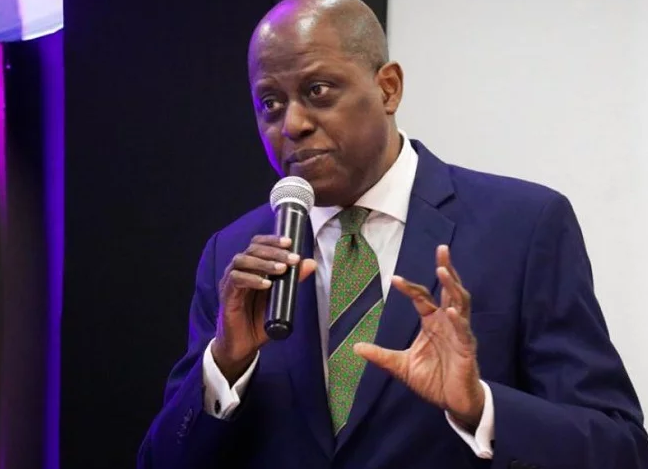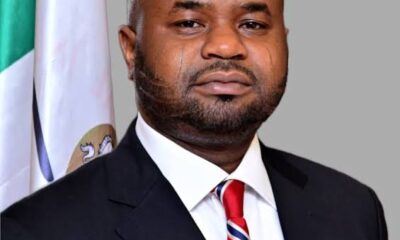Business
FIRS reforms pay off, collected N10.1tn tax revenue in 2022

The Federal Inland Revenue Service says it collected N10.1 trillion as tax revenues in 2022.
It disclosed this in its ‘FIRS 2022 Performance Update’ report signed by its Executive Chairman, Mr Muhammad Nami, which was released in Abuja on Monday.
It said, “The FIRS in the year 2022 collected a total of N10.1 trillion in both oil (N4.09 trillion) and non-oil (N5.96 trillion) revenues as against a target of N10.44 trillion.
“Companies Income Tax contributed N2.83 trillion; Value Added Tax N2.51 trillion; Electronic Money Transfer Levy N125.67 billion and Earmarked Taxes N353.69 billion.
“Non-oil taxes contributed 59% of the total collection in the year, while oil tax collection stood at 41% of total collection.”
The report indicated that it was the first time that the FIRS would cross the 10-trillion naira mark in tax revenue collection.
It added that the N10.1 trillion was inclusive of the N146.27 billion which is the total value of certificates issued by the FIRS to private investors and the NNPC for road infrastructure under the Road Infrastructure Development Refurbishment Investment Tax Credit Scheme created by Executive Order No. 007 of 2019.
The total sum also included tax waivers on account of various tax incentives granted under the respective laws, which amounted to N1.81 trillion.
The FIRS said that the feat was made possible by the Nami-led management’s, administrative and operational restructuring; making the service customer-focused; creating a data-centric institution; and automation of administrative and operational processes.
He said, “The reforms introduced at different times from 2020 are gradually yielding fruits. By the close of 2022, the Service had fully restructured the administration of the service for maximum efficiency and achieved internal cohesion such that all functional units are working in unison towards the achievement of set goals.
“As a result of conducive environment created for staff, officers of the service are pulling their weight on the global stage with international recognitions and awards;
“The service had also automated most of the administrative and operational processes. A major leap was the full deployment of the TaxPro Max for end-to-end administration of taxes in June 2021. The module for the automated TCC went live 1st January 2023 while taxpayers had already downloaded over 1,000 TCCs this year without having to visit FIRS office.”
The organisation said that it had operationalised its data mining and analysis system thereby allowing for data-backed taxpayer profiling.
Commenting on the 2022 performance, Nami said that success was achieved through the “dogged implementation of strategic reforms over the past two years; a renewed commitment by officers of the Service, accompanied with a boosted morale; as well as the innovative deployment of technology for automation of both tax administration and operational processes.
“This collection was possible through collaboration with our stakeholders, from our colleagues at the executive branch of government, to the members of the judiciary, to our brothers and sisters at the National Assembly, as well as the tax advisory committee, professional bodies, unions, and most crucially our taxpayers.”
Speaking on the outlook for 2023, Nami stated that the FIRS would build on the current reforms, achieve full automation and continue to establish a resilient service that would continue to provide sustainable tax revenue to fund the government.
“We intend to maintain, and even improve on the momentum in 2023,” he stated.
He also said, “We have peaked, but this is not certainly our peak. In fact, my hope is that this would be the least sum the service would ever collect going forward.
“Our goal is to identify more areas where we can improve on in the delivery and efficiency of our collection; and plug loopholes, while deploying innovative reforms in data and artificial intelligence.
“Ultimately, we believe that the FIRS can shoulder the responsibility of providing revenue needed for the governments across the Federation to cater for the needs of the Nigerian people through taxes.
“This is feasible once we get the much-desired support from the three tiers and arms of government, as well as all stakeholders.”
Business
Tron Founder joins Trump-backed crypto project, invests $30m

Tron Founder joins Trump-backed crypto project, invests $30m
Justin Sun, the founder of the Tron Blockchain has joined the World Liberty Financial project as an advisor after investing $30 million into the project.
The World Liberty Financial project is backed by the Donald Trump family and aims to become a leading crypto project in the global crypto space.
Justin Sun joined the project as an advisor after purchasing $30 million worth of WLFI tokens making him the largest shareholder in the project.
The development was announced via the official X page of the World Liberty Financial project welcoming the Crypto founder to the project.
“Exciting Announcement!
We’re honored to welcome @justinsuntron as an advisor to World Liberty Financial (WLFI)! Justin is the founder of @TRONDAO an advisor to @HTX_Global, and a supporter of @BitTorrent
. A graduate of the University of Pennsylvania, he recently won Sotheby’s auction for the iconic banana artwork.
#TRON is among the world’s top 10 cryptocurrencies and one of the largest public blockchains. Justin’s insights and experience will be instrumental as we continue to innovate and grow. Welcome to the team, Justin!” WLFI tweeted
READ ALSO:
- Drama as Yahaya Bello calms supporters after judge storms out of court over rowdiness
- NAF destroys terrorists’ gun truck, neutralizes over 20 fighters, repels attack on troops
- They want to cancel my show in Nigeria over economy comment – Davido
Justin Sun’s $30 million investment in the project boosted the sales traffic of its native token raising it from $21 million to $53 million.
The increased inflow of capital into the project better positions the project to achieve its goals which include a stablecoin-focused credit card and infrastructure enhancement.
Justin Sun brings onboard his wealth of experience as the founder of one of the Top 10 blockchains in the industry by market cap and his advisory role at HTX and BitTorrent.
Sun’s previous track record of bold investments and innovation is expected to be a huge boost to the WLFI project.
The WLFI gig is another feather to the hat of Justin Sun as he expands his activities in the crypto space. The Tron founder recently purchased a 6.3 million NFT art in a bid to revive a stagnant sector.
The World Liberty Financial project is backed by Donald Trump’s family and it looks to promote the mass adoption of Defi and stablecoins. This project aligns with the Donald Trump pro-crypto mantra and has all the credibility a project of that status needs.
Tron Founder joins Trump-backed crypto project, invests $30m
Auto
Toyota By CFAO showcases latest Land Cruiser Prado, others at P’Harcourt Open Day

Toyota By CFAO showcases latest Land Cruiser Prado, others at P’Harcourt Open Day
Toyota By CFAO, the authorized distributor of Toyota vehicles in Nigeria, has commenced a three-day special display of the latest new Toyota models from the company at an Open Day organised in Port Harcourt, Rivers State, for residents of the city and its surrounding areas.
The Toyota By CFAO Open Day holds from Tuesday, November 26 to Thursday, November 28, 2024, according to a statement by the company.
The event running from 9am to 5pm each day is taking place at the auto company’s showroom located at 184B, Trans-Amadi Industrial Layout, Port Harcourt.
It discloses that the exciting event will feature the highly anticipated 2024 Toyota Land Cruiser Prado, one of Toyota’s flagship models, alongside a range of other exceptional vehicles tailored for the Nigerian market.
This, it notes, is an exclusive opportunity for attendees to explore the latest in automotive excellence, discover new vehicle options, and benefit from Toyota By CFAO’s End of Year Bonanza.
General Manager of CFAO Mobility Port Harcourt, Julius Fasetire, encourages all residents to “come witness history in motion as we proudly unveil the All-New 2024 Toyota Land Cruiser Prado.

“Be among the first to explore this remarkable masterpiece and discover our full range of Toyota vehicles. Don’t miss out on the chance to experience automotive excellence and enjoy a free diagnostic check for your Toyota vehicle!”
The 2024 Toyota Land Cruiser Prado has already generated excitement across the country, following its recent unveilings in Lagos and Abuja.
The product is quickly becoming one of the most sought-after sports utility vehicles in Nigeria, appealing to both corporate and individual buyers.
With over 11.3 million units sold globally in more than 170 countries, the Land Cruiser Prado is renowned for its rugged off-road capabilities and comfort for everyday driving.
The firm says this year’s model comes in two distinctive editions – the Limited Edition (First Edition) and the Adventure Edition – both equipped with a 2.4L turbocharged gasoline engine and an 8-speed automatic transmission, ensuring superior performance both on and off the road.
Toyota By CFAO also says it ensures that genuine parts and a comprehensive 3-year/100,000 kilometre warranty are available for all customers.
In addition to the Land Cruiser Prado, the event will showcase a variety of other popular Toyota models including the Belta, Rumion, RAV4, Camry, and Hiace.
The Open Day, it stresses, promises to be a must-attend event for anyone interested in exploring the world of Toyota vehicles, from luxury to practicality, and experiencing firsthand the future of automotive technology.

The company says more details about the rich offering of Toyota in the Nigeria market can be obtained from https://www.toyotabycfao.ng/.
Business
Nigeria’s foreign reserves in marginal increase, now $40.88bn

Nigeria’s foreign reserves in marginal increase, now $40.88bn
Nigeria’s foreign reserves rose to $40.88 billion as of November 21, the Governor of the Central Bank of Nigeria (CBN), Olayemi Cardoso, has said.
Cardoso disclosed this on Tuesday at a press conference after the Monetary Policy Committee’s 298th meeting in Abuja.
He said the external reserves grew from $40.06 billion at the end of October to $40.88 billion in November.
The amount represents an increase of $82 million or 2.05 per cent in 21 days.
“The external reserves rose marginally to 40.88 billion as of 21 November 2024, from 40.06 billion at the end of October 2024, available to finance 17 months of imports,” he said.
However, from the apex bank’s website, the increase in Nigeria’s foreign reserves showed $40.27 billion on November 22.
Cardoso also said, “The process of getting us where we are in terms of reserves has been a long one”.
“It is a clear indication that the policies we have put in place are certainly yielding fruits,” he added.
“However, and it’s very important to make a distinction here and to reiterate the fact that reserves are there for a multiplicity of different purposes, not least of which is to create buffers in the event of unanticipated shocks.
“So they are not there to simply whittle away. They are there to be used to more or less defend yourself where that becomes necessary
“And when we talk about shocks that are not anticipated, I think we can see how the global economies are.”
Cardoso also said the bank would continue to intensify efforts to stabilise the currency and prices.
The CBN governor said, “The currency has been stable compared to what it was in June”.
But he said for the value of the country’s currency to be stable, there must be increased exports and diversification of the economy.
Cardoso said diaspora remittance had increased due to policies put in place.
He commended those in the diaspora for helping the country accomplish over $600 million in remittances.
-

 metro1 day ago
metro1 day agoBREAKING: Port Harcourt refinery begins operation
-

 Sports1 day ago
Sports1 day agoFrench football star, Paul Pogba’s blackmail trial begin in Paris
-

 Politics2 days ago
Politics2 days agoLagos 2027: Seyi Tinubu campaign team releases his life documentary
-

 Entertainment2 days ago
Entertainment2 days agoPolygamy best form of marriage for Africa – Okey Bakassi
-

 metro2 days ago
metro2 days ago40-foot container falls on car in Lagos
-

 International2 days ago
International2 days agoTrump to sack 15,000 transgender officers from U.S. military: Report
-

 Education1 day ago
Education1 day agoUS University opens 2025 scholarships for international students
-

 News1 day ago
News1 day agoYahaya Bello reports to EFCC office with lawyers










